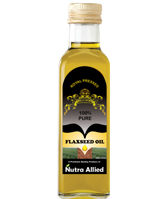Linseed oil, also known as flaxseed oil, is a colourless to yellowish oil obtained from the dried ripe seeds of the flax plant (Linum usitatissimum, Linaceae). The oil is obtained by pressing, sometimes followed by solvent extraction. Due to its high levels of α-Linoleic acid (a particular form of omega-3 fatty acid), it is used as a nutritional supplement.
Linseed oil is a drying oil, meaning it can polymerize into a solid form. Due to its polymer-forming properties, linseed oil is used on its own or blended with other oils, resins, and solvents as an impregnator and varnish in wood finishing, as a pigment binder in oil paints, as a plasticizer and hardener in putty, and in the manufacture of linoleum. Linseed oil use has declined over the past several decades with increased availability of synthetic alkyd resins—which function similarly but resist yellowing.
Linseed oil is edible oil marketed as a nutritional supplement. In parts of Europe, it is traditionally eaten with potatoes and quark (cheese). It is regarded as a delicacy due to its hearty taste, which spices the bland quark.
The oil is extracted or derived from the dried ripe seeds of linseed. Linseed benefits are due to the presence of omega-6 and omega-9 essential fatty acids which makes it an ideal alternative to fish oil for vegetarians. Raw linseed oil is obtained by pressing and crushing the linseeds followed by solvent extraction. Raw linseed oil which is cold pressed oil is the best form of linseed oil that holds maximum medicinal properties.
Although flax seeds contain lignin’s, a class of phytoestrogens considered to have antioxidant and cancer-preventing properties, the extracted linseed oil according to some, does not contain lignin’s found in flax seed, and allegedly does not have the same antioxidant properties. Some brands of supplement have lignins added during production. Flax seed oil is easily oxidized, and rapidly becomes rancid, with an unpleasant odor, unless refrigerated. Even when kept under cool conditions, it has a shelf life of only a few weeks. Oil with an unpleasant or rancid odor should be discarded. Oxidation of flax seed oil is a major commercial concern, and antioxidants may be added to prevent rancidification. The alpha linolenic acid (ALA) in flaxseed oil is suitable for cooking, as it (and the lignans in flax seeds themselves) can withstand temperatures up to 350 degrees F (176.67 C) for two hours.
Food-grade flaxseed oil is cold-pressed, obtained without solvent extraction, in the absence of oxygen, and marketed as edible flaxseed oil. Fresh, refrigerated and unprocessed, linseed oil is used as a nutritional supplement and is a traditional European ethnic food, highly regarded for its hearty taste. It contains the highest level of the omega-3 fatty acid ALA among vegetable oils. Regular flaxseed oil contains between 52% and 63% ALA (C18:3 n-3). Plant breeders have developed flaxseed with both higher ALA (70%) and very low ALA content (< 3%). The USFDA granted generally recognized as safe (GRAS) status for high alpha linoleic flaxseed oil. |





